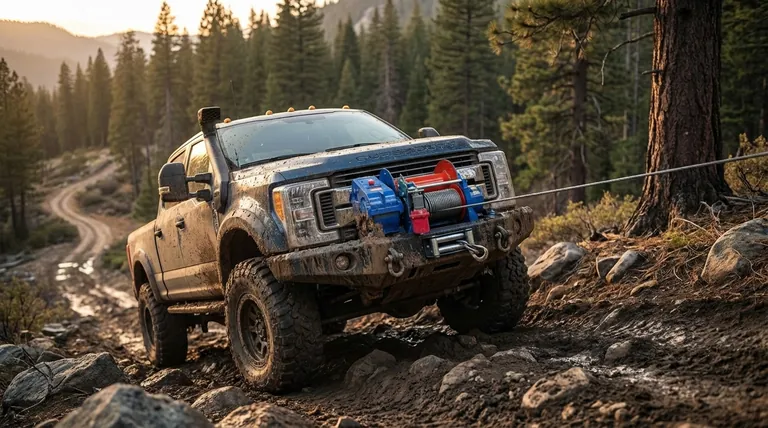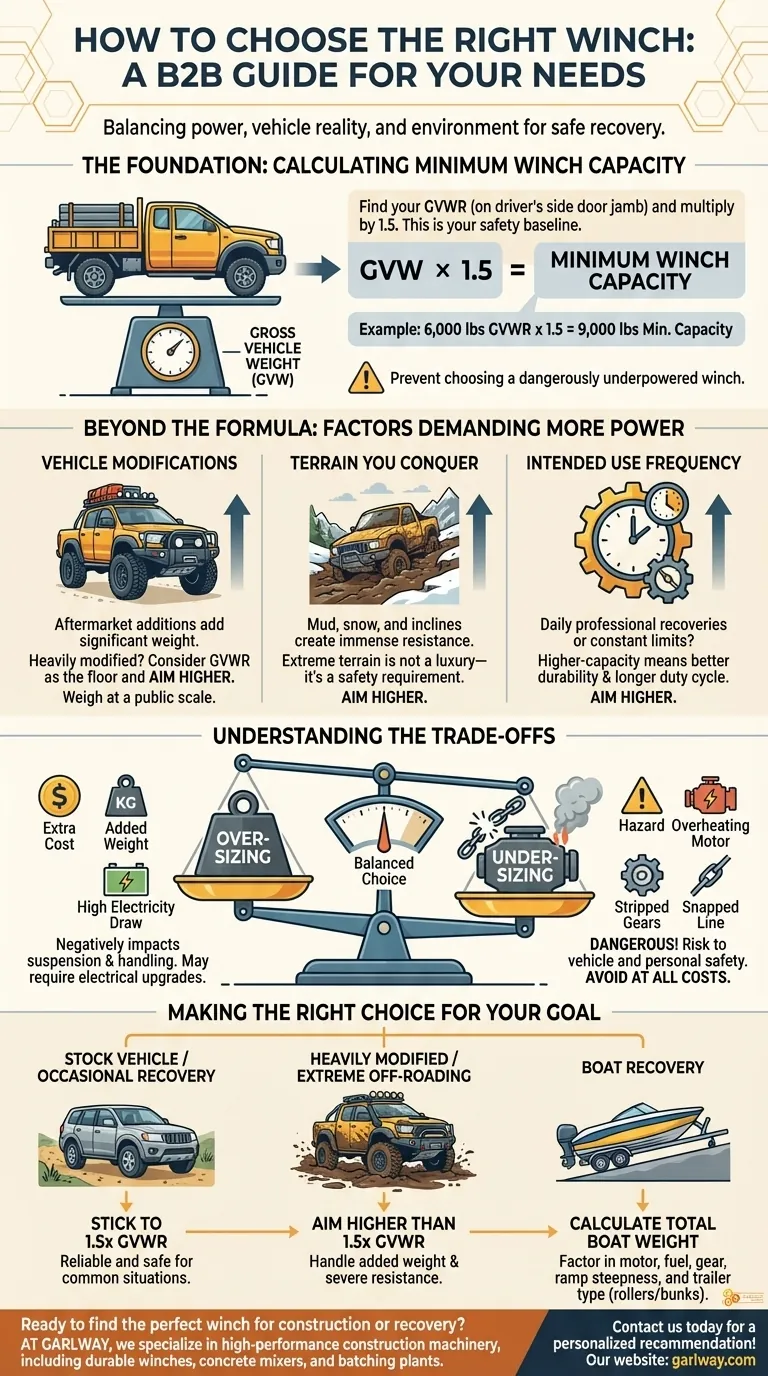Choosing the right winch is a critical decision that balances raw power with the specific realities of your vehicle and environment. The universally accepted rule of thumb is to select a winch with a rated capacity of at least 1.5 times your vehicle's fully loaded weight, known as its Gross Vehicle Weight (GVW). This ensures you have enough pulling power to overcome the additional forces of friction and gravity in a recovery situation.
While the 1.5x weight formula provides an essential safety baseline, it's only the starting point. The right winch is ultimately determined by a clear understanding of your vehicle's modifications, the terrain you plan to tackle, and how frequently you'll rely on it.

The Foundation: Calculating Your Minimum Winch Capacity
Your first step is to establish a non-negotiable minimum pulling power. This calculation prevents you from choosing a winch that is dangerously underpowered for your needs.
Find Your Vehicle's Gross Vehicle Weight (GVW)
The most important number in this process is your vehicle's weight. You'll often see the term Gross Vehicle Weight Rating (GVWR), which is the maximum safe operating weight of your vehicle, including cargo and passengers.
You can find the GVWR printed on a sticker inside the driver’s side door jamb. For winch selection, using the GVWR is a safe and conservative starting point.
Apply the 1.5x Safety Multiplier
Once you have your GVWR, the calculation is simple: GVWR x 1.5 = Minimum Winch Capacity.
For example, if your truck has a GVWR of 6,000 lbs, your minimum winch capacity would be 9,000 lbs (6,000 x 1.5). This multiplier accounts for the extra force required to pull a vehicle that is stuck in mud, climbing an incline, or bogged down by other obstacles.
Beyond the Formula: Factors That Demand More Power
The 1.5x rule is perfect for a stock vehicle in typical situations. However, several factors can dramatically increase the load on your winch, requiring you to aim for a higher capacity.
The Impact of Vehicle Modifications
Aftermarket additions add significant weight that the original GVWR doesn't account for. Heavy-duty bumpers, larger tires, roof racks, and permanent recovery gear can easily add hundreds of pounds.
If your vehicle is heavily modified, you should consider your GVWR as the absolute floor and aim for a higher capacity. Getting your vehicle weighed at a public scale provides the most accurate number to use in your calculation.
The Terrain You Conquer
The environment is a massive variable. Pulling a vehicle on flat, dry ground is completely different from extracting one from deep mud, thick snow, or up a steep, rocky hill.
These conditions create immense resistance and suction, effectively increasing the "weight" your winch has to pull. If you frequent extreme terrain, a higher-capacity winch is not a luxury—it's a critical safety tool.
Your Intended Use Frequency
If you are a professional who performs recoveries daily or an enthusiast who consistently pushes your vehicle to its limits, investing in a heavier-duty winch is wise.
Higher-capacity winches are built with more robust components, offering better durability and a longer duty cycle to handle repeated, strenuous use without overheating or failing.
Understanding the Trade-offs
Choosing a winch isn't about simply buying the most powerful one you can find. It involves a balance of capability, cost, and vehicle compatibility.
The Cost of Over-Sizing
An excessively large winch is not only more expensive but also significantly heavier. This added weight on the front of your vehicle can negatively affect suspension performance and handling.
Furthermore, a powerful winch draws a massive amount of electricity, potentially requiring upgrades to your vehicle's battery and alternator to keep up with the demand.
The Danger of Under-Sizing
This is the most critical trade-off to avoid. An underpowered winch is a hazard. When overloaded, it can overheat its motor, strip its gears, or lead to a snapped line under tension—an extremely dangerous event.
The 1.5x rule should be treated as a strict minimum. Saving money on a weaker winch puts both your vehicle and your personal safety at significant risk.
Making the Right Choice for Your Goal
With this information, you can move from a general rule to a specific, informed decision that matches your exact needs.
- If your primary focus is occasional recovery with a stock vehicle: Sticking to the 1.5x GVWR formula will provide a reliable and safe margin for most common situations you'll encounter.
- If your primary focus is extreme off-roading or you have a heavily modified rig: Use the 1.5x formula as a bare minimum and strongly consider a winch with a higher rating to handle the added weight and severe resistance.
- If your primary focus is recovering a boat: Your calculation should be based on the total weight of the boat (including motor, fuel, and gear), factoring in the steepness of the boat ramp and whether your trailer uses rollers or bunks.
By analyzing your specific use case instead of just the numbers, you can select a winch that will serve as a reliable partner when you need it most.
Summary Table:
| Key Factor | Consideration | Recommendation |
|---|---|---|
| Vehicle Weight (GVW) | Use Gross Vehicle Weight Rating | Minimum winch capacity = GVW x 1.5 |
| Vehicle Modifications | Added weight from bumpers, gear, etc. | Consider higher capacity if heavily modified |
| Terrain Type | Mud, snow, or steep inclines increase resistance | Opt for higher capacity for extreme conditions |
| Usage Frequency | Daily or heavy use requires durability | Choose a robust winch with a longer duty cycle |
Ready to find the perfect winch for your construction or recovery needs? At GARLWAY, we specialize in high-performance construction machinery, including durable winches, concrete mixers, and batching plants designed for contractors and construction companies worldwide. Our experts can help you select a winch that matches your vehicle's specifications and job requirements, ensuring safety and reliability in the toughest conditions.
Contact us today for a personalized recommendation and discover how GARLWAY can power your projects!
Visual Guide

Related Products
- Electric and Hydraulic Winch for Heavy Duty Applications
- Warn Winch Windlass Boat Trailer Winch
- Electric 120V Boat Winch by Badlands
- Best 18000 Pound Drum Anchor Trailer Winch
- 12000 lb Heavy Duty Electric Boat Winch
People Also Ask
- What types of cable release systems do hydraulic winches have? Choose Between Mechanical or Pneumatic
- Where are hydraulic winches commonly used? Essential for Heavy-Duty Industrial & Recovery
- How does concrete shrinkage affect construction? Control Cracking for Durable Structures
- How does vehicle size affect winch usage? Choose the Right Winch for Your Truck's Weight
- What role do winches play in a tie down system? Achieve Maximum Cargo Security
- What are the durability benefits of hydraulic winches? Superior Performance for Heavy-Duty Tasks
- What are the recommended practices for the installation and maintenance of hydraulic winches? Ensure Maximum Reliability & Lifespan
- What type of hydraulic motor is commonly used in winches? Roller Stator Motors for Maximum Torque



















